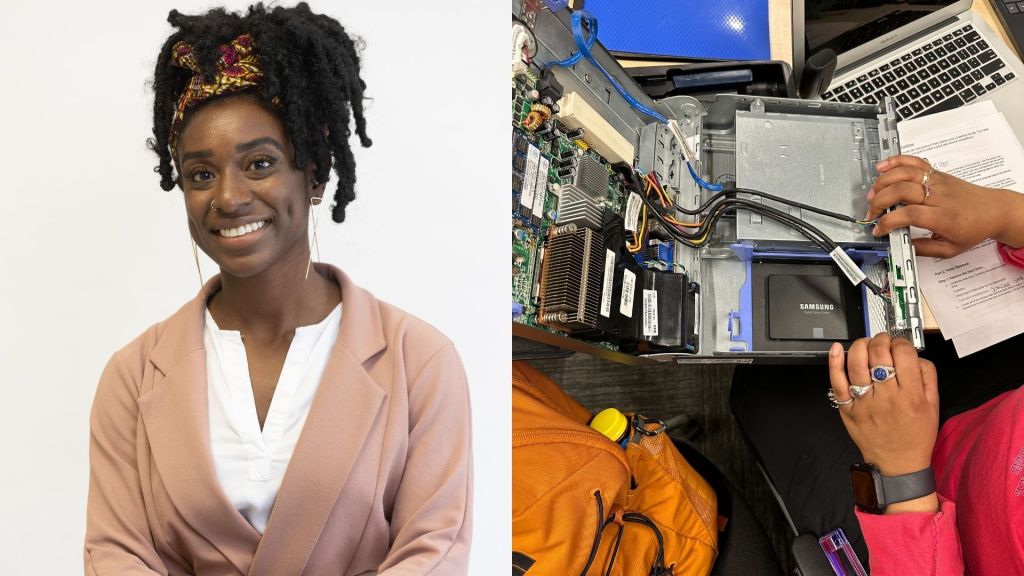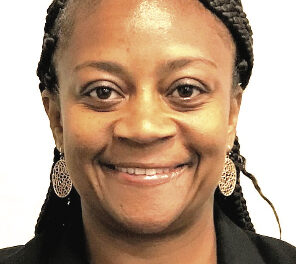By Megan Sayles
AFRO Business Writer
msayles@afro.com
In February, retired Navy veteran John Wright came to his social worker with a new interest. He wanted to learn more about computers.
Wright, 58, spent much of his career in security and law enforcement and was comfortable performing day-to-day tasks without relying on technology. But, it was time for a change.
“I noticed I wasn’t as literate in computers as I needed or wanted to be,” said Wright. “I set the goal for myself to learn new things and adapt to them.”
Wright’s social worker from the Veterans Affairs Department began looking for computer training classes and schools that Wright could join. She landed on Byte Back, a nonprofit working to close the digital divide in Washington D.C. and Baltimore.
To achieve this lofty goal, the organization provides free digital literacy and tech certification training to residents from underserved communities. In Computer Foundations 1, adults who have limited experience with digital devices learn how to use a mouse, navigate their email and the internet and about computers’ components and processes.
They build on this knowledge in Computer Foundations 2, learning how to use Microsoft Word, Excel and PowerPoint in their daily lives and in professional settings.
Wright’s already completed Computer Foundations 1, and he’s enrolled in Computer Foundations 2.
“I feel more comfortable when I’m navigating the computer as far as using apps. I now know what the terminology means when someone says something pertaining to a computer,” said Wright. “I actually know how to compose an email, send it and how to use the search bar to recover emails I’ve sent. They’ve helped me to be confident in my abilities.”
Paying his rent online has also become easier.
“When I go into my rental portfolio, I know I have to do a left click to go to the next page,” said Wright. “Before, I wasn’t sure if it was a right click or left click.”
Byte Back’s programming has become increasingly important considering so much of everyday life is now tied to technology. Today, people use devices to pay their bills, book travel, manage their health, shop and more.
Baltimore site director Wynisha Witt said the COVID-19 pandemic especially shed light on this reality.
“We came to realize that technology is really at the intersection of everything. It became really transparent with the pandemic, especially with Baltimore City residents needing to access their food stamps, supplemental security income and all of their benefits online,” said Witt. “People were losing their benefits because they weren’t able to do redeterminations on pen and paper and couldn’t go to offices at the time.”
In 2021, Baltimore Mayor Brandon M. Scott created the Office of Broadband and Digital Equity and tasked it with permanently closing the digital divide in the city by 2030. This includes providing residents with access to reliable, high-speed internet, devices, digital skills training and technical support.
Two years later, the mayor used $1 million in American Rescue Plan Act (ARPA) money, to launch the Digital Equity Fund. The initiative has since awarded grants to 22 organizations working to expand digital inclusion. Byte Back received $74,739 to support its digital literacy curriculum.
“It’s really important for individuals here in Baltimore City to have access to classes that are teaching them how to navigate the computer and how to do it safely. A lot of individuals that I come into contact with are fearful of using the computer,” said Witt. “Because we’re providing a safe space, we’re able to show them that the internet is not a scary place and that it can be an asset to them.”
The other class that Byte Back offers is IT Fundamentals (ITF+) through the Computing Technology Industry Association (CompTIA). It’s an entry-level course on basic IT skills and competencies. The organization also offers Network+ and Security+ certifications through CompTIA.
The classes expose participants to fundamentals for careers in help desks, cybersecurity and network administrators and equip them with industry certifications.
“It sets them up to identify which pathway they want to take,” said Winn. “These jobs can increase their income significantly, and they are more accessible because a lot of jobs outside of an IT technician are remote. A lot of barriers that people have to employment are alleviated when it comes to transportation and childcare.”
Baltimore native Beronica Martin discovered Byte Back while working as a home health aide. A client of hers was enrolled in Computer Foundations I, and Martin would take him to the classes.
Her interest was piqued after listening in on a few sessions, and she decided to enroll herself. Martin has now taken both Computer Foundation I and II, and she’s preparing to enroll in the Security+ training.
She, like Wright, had limited knowledge of computers.
“I probably was introduced, but I didn’t grasp it,” said Martin. “I think now that I’m older, I’m able to grasp it.”
Now a medical assistant, Martin has used some of her new-found skills to design flyers and memos at work. She has also encouraged her aunt, who is an older adult, and a friend, who is a returning citizen, to take the training.
“You’re going to need technology in every aspect of living now. Everything from going to the market to paying your bills is mostly online,” said Martin. “This training gives you a better opportunity to do these things and to go on a different career path if you want that.”
Both Wright and Martin said they consider their classmates and instructors at Byte Back as family. They encourage one another and check in when someone is absent.
“Byte Back has turned into an extended family of mine,” said Wright. “I know if I’m having problems, I can always call them day or night or leave an email, and they will address any concerns that I have. Nothing is too trivial.”
This year, Byte Back’s Baltimore office is focused on making its classes more accessible. The organization intends to forge partnerships with senior housing facilities to engage more older adults and with organizations in each region of the city.
Winn hopes this will curb transportation challenges that prevent residents from taking the classes.
“Because classes are in-person, the constant conversation is about transportation,” said Winn. “Going forward, we’re trying to gain funding so that we’re able to provide a stipend to help support individuals while they’re in classes.”
Megan Sayles is a Report for America corps member.
This story is part of the Digital Equity Local Voices Fellowship lab. The lab initiative is made possible with support from Comcast NBC Universal.
The post Bridging the gap: How Byte Back brings free digital literacy training to Baltimore’s underserved communities appeared first on AFRO American Newspapers.











